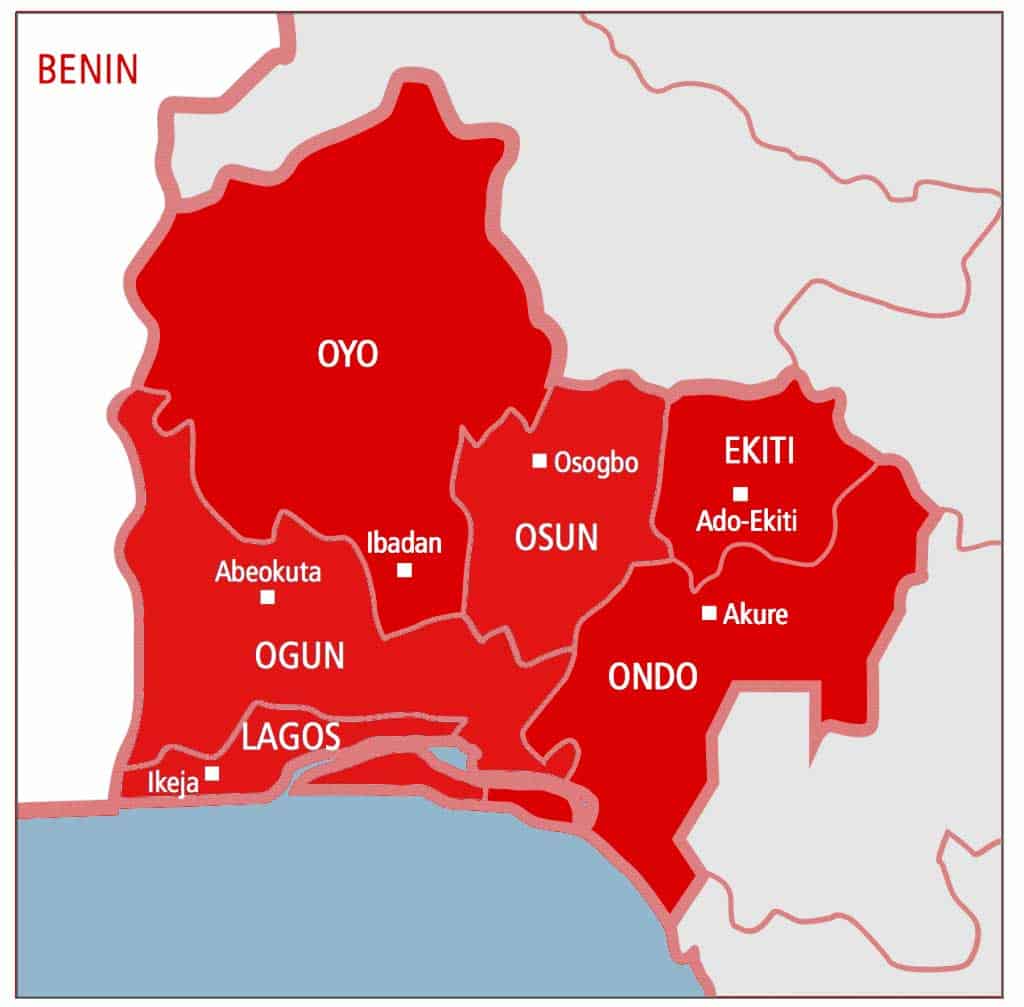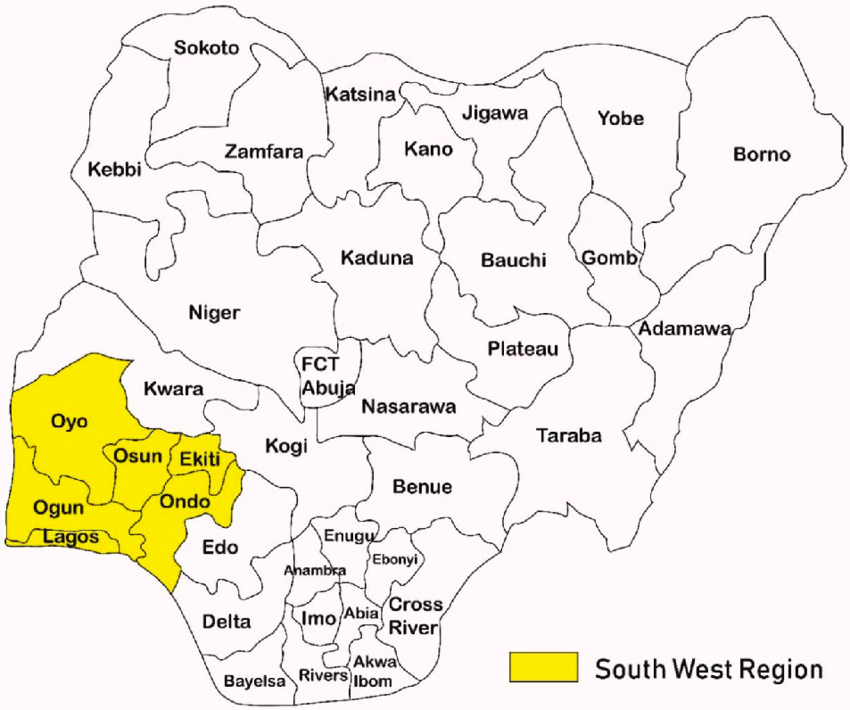South West
Region Dec 29, 2024 Last Modified:Jan 03, 2025

Table of Contents
- 1 Exploring the Rich History and Culture of South West Nigeria
- 2 An Overview of South West Nigeria
- 3 Historical Background
- 4 Cultural Landmarks and Attractions
- 5 1. Ile-Ife
- 6 2. Olumo Rock
- 7 3. Osun-Osogbo Sacred Grove
- 8 4. Lagos Island
- 9 Traditions and Festivals
- 10 1. Eyo Festival
- 11 2. Osun-Osogbo Festival
- 12 3. Egungun Festival
- 13 Modern Contributions and Legacy
- 14 Conclusion
Exploring the Rich History and Culture of South West Nigeria
The South West Region of Nigeria is a fascinating area steeped in history, culture, and tradition. Known for its vibrant Yoruba heritage, the region plays a pivotal role in the story of Nigeria, offering a blend of ancient practices, colonial influences, and modern development. This article delves into the historical significance, cultural landmarks, and unique traditions that define South West Nigeria.
An Overview of South West Nigeria

South West Nigeria is one of the six geopolitical zones in the country. It comprises six states: Lagos, Ogun, Oyo, Osun, Ondo, and Ekiti. The region is predominantly inhabited by the Yoruba people, one of the largest ethnic groups in Africa. Known for their rich traditions, the Yoruba are celebrated for their contributions to arts, religion, governance, and commerce.
Historical Background
The history of South West Nigeria is deeply rooted in the Yoruba civilization, which dates back over a thousand years. The Yoruba people established powerful kingdoms such as Oyo, Ife, and Ijebu. Ife, often regarded as the cradle of Yoruba civilization, is famous for its intricate bronze and terracotta sculptures that date back to the 12th century.
During the pre-colonial era, the Oyo Empire was one of the most powerful and organized political entities in West Africa. It controlled vast territories through its military might and sophisticated administrative systems. The transatlantic slave trade, however, disrupted the region’s development, leading to significant changes in its social and economic structures.
In the colonial period, South West Nigeria became a hub of education and political activism. Cities like Lagos and Ibadan played crucial roles in Nigeria’s independence movement, hosting influential figures such as Herbert Macaulay, Obafemi Awolowo, and Nnamdi Azikiwe.
Cultural Landmarks and Attractions
South West Nigeria is home to numerous cultural landmarks that attract visitors from around the world. Some of the most notable sites include:
1. Ile-Ife
Referred to as the spiritual homeland of the Yoruba people, Ile-Ife is a city rich in mythology and history. It is believed to be the birthplace of humanity in Yoruba cosmology and is home to the Ooni of Ife, a revered traditional ruler.
2. Olumo Rock
Located in Abeokuta, Ogun State, Olumo Rock served as a natural fortress for the Egba people during inter-tribal wars in the 19th century. Today, it is a popular tourist destination, offering panoramic views of the city.
3. Osun-Osogbo Sacred Grove
A UNESCO World Heritage Site, the Osun-Osogbo Sacred Grove is a forest sanctuary that honors Osun, the Yoruba goddess of fertility. The site is adorned with sculptures, shrines, and artworks that reflect Yoruba spiritual beliefs.
4. Lagos Island
As Nigeria’s commercial capital, Lagos is a bustling metropolis with a mix of historical and modern attractions. Lagos Island, in particular, features landmarks such as the National Museum, Freedom Park, and the iconic Tafawa Balewa Square.
Traditions and Festivals
South West Nigeria is renowned for its vibrant festivals that celebrate Yoruba culture and spirituality. These events showcase traditional music, dance, attire, and rituals. Some of the most popular festivals include:
1. Eyo Festival
Held in Lagos, the Eyo Festival is a colorful masquerade procession that honors the spirits of departed ancestors and celebrates the city’s cultural heritage.
2. Osun-Osogbo Festival
This annual event in Osogbo attracts thousands of devotees and tourists who come to pay homage to the goddess Osun. It is a celebration of spirituality, art, and community.
3. Egungun Festival
The Egungun Festival honors ancestral spirits through elaborate masquerade performances. It is a significant tradition in Yoruba culture, emphasizing the connection between the living and the dead.
Modern Contributions and Legacy
Today, South West Nigeria continues to be a leader in education, economy, and innovation in the country. The region boasts some of Nigeria’s most prestigious universities, such as the University of Ibadan and Obafemi Awolowo University. Lagos, as the economic hub, drives the nation’s growth with its bustling industries and international trade.
The legacy of South West Nigeria’s historical and cultural contributions remains evident in its art, literature, and governance. From the literary works of Wole Soyinka to the architectural wonders of ancient Yoruba cities, the region’s influence transcends generations.
Conclusion
South West Nigeria is a treasure trove of history and culture, offering a glimpse into the rich heritage of the Yoruba people. Its ancient kingdoms, vibrant festivals, and modern achievements highlight the resilience and creativity of its inhabitants. Whether you’re a history enthusiast or a curious traveler, South West Nigeria promises an unforgettable journey into the heart of Africa’s cultural legacy.
